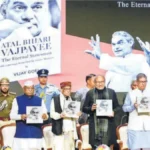“Remembering Lal Bahadur Shastri: A Visionary Leader and His Timeless Legacy”
Lal Bahadur Shastri, one of India’s most revered leaders, left an indelible mark on the nation during his tenure as Prime Minister. His life and legacy continue to inspire generations of aspirants, including those preparing for various government exams. In this article, we delve into the historical context, the importance of his leadership, and key takeaways that every aspiring civil servant should know.

Why this News is Important
Lal Bahadur Shastri’s leadership holds immense significance in the annals of Indian history, and understanding his contributions is crucial for aspirants preparing for government exams.
Historical Context
- Post-Independence Challenges: India faced numerous challenges post-independence, including food shortages and external threats. Shastri’s leadership during the Indo-Pak War of 1965 showcased his dedication to protecting India’s sovereignty.
- The Green Revolution: Shastri initiated the Green Revolution, promoting modern agricultural techniques to increase food production. This effort played a pivotal role in alleviating food scarcity in the country.
- The Tashkent Agreement: He played a crucial role in resolving the Indo-Pak conflict through the Tashkent Agreement in 1966, demonstrating his commitment to peace and diplomacy.
Key Takeaways from This News
| Serial Number | Key Takeaway |
|---|---|
| 1 | Shastri’s leadership during the 1965 war was marked by his resolute stance in defending India’s borders. |
| 2 | The Green Revolution under his leadership significantly boosted agricultural production, addressing food shortages. |
| 3 | The Tashkent Agreement showcased his dedication to diplomatic solutions and peace in the region. |
| 4 | His famous slogan “Jai Jawan, Jai Kisan” emphasized the importance of both soldiers and farmers in nation-building. |
| 5 | Shastri’s simplicity and integrity serve as a timeless example for leaders and citizens alike. |
Important FAQs for Students from this News
Q1: Who was Lal Bahadur Shastri, and why is he significant for government exam aspirants?
A1: Lal Bahadur Shastri was India’s second Prime Minister known for his leadership during the 1965 war, the Green Revolution, and the Tashkent Agreement. His significance lies in his exemplary leadership qualities, which are often asked about in exams.
Q2: What was the “Green Revolution” initiated by Lal Bahadur Shastri?
A2: The Green Revolution was a set of agricultural practices introduced by Shastri to increase food production, thereby addressing food shortages in India.
Q3: What was the outcome of the Tashkent Agreement, and why is it important?
A3: The Tashkent Agreement helped resolve the Indo-Pak conflict in 1966. It is important as it highlights Shastri’s commitment to diplomatic solutions and regional peace.
Q4: What is the significance of Shastri’s slogan, “Jai Jawan, Jai Kisan”?
A4: The slogan emphasizes the importance of both soldiers (Jawan) and farmers (Kisan) in nation-building, a concept relevant to leadership and governance.
Q5: How can Lal Bahadur Shastri’s life and legacy inspire government exam aspirants?
A5: Shastri’s simplicity, integrity, and dedication to the nation serve as timeless examples for aspiring civil servants.
Some Important Current Affairs Links

















